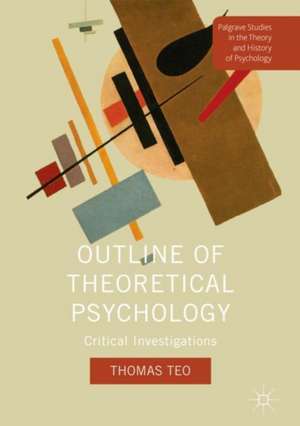Outline of Theoretical Psychology: Critical Investigations: Palgrave Studies in the Theory and History of Psychology
Autor Thomas Teoen Limba Engleză Hardback – 24 mai 2018
| Toate formatele și edițiile | Preț | Express |
|---|---|---|
| Paperback (1) | 486.80 lei 6-8 săpt. | |
| Palgrave Macmillan UK – 21 apr 2021 | 486.80 lei 6-8 săpt. | |
| Hardback (1) | 644.95 lei 6-8 săpt. | |
| Palgrave Macmillan UK – 24 mai 2018 | 644.95 lei 6-8 săpt. |
Din seria Palgrave Studies in the Theory and History of Psychology
- 18%
 Preț: 721.63 lei
Preț: 721.63 lei -
 Preț: 229.19 lei
Preț: 229.19 lei -
 Preț: 197.61 lei
Preț: 197.61 lei -
 Preț: 396.24 lei
Preț: 396.24 lei - 15%
 Preț: 637.13 lei
Preț: 637.13 lei -
 Preț: 382.57 lei
Preț: 382.57 lei - 5%
 Preț: 843.38 lei
Preț: 843.38 lei - 15%
 Preț: 470.38 lei
Preț: 470.38 lei - 15%
 Preț: 469.91 lei
Preț: 469.91 lei - 9%
 Preț: 693.03 lei
Preț: 693.03 lei -
 Preț: 485.61 lei
Preț: 485.61 lei - 15%
 Preț: 531.41 lei
Preț: 531.41 lei - 18%
 Preț: 949.73 lei
Preț: 949.73 lei -
 Preț: 486.80 lei
Preț: 486.80 lei - 9%
 Preț: 805.29 lei
Preț: 805.29 lei - 9%
 Preț: 806.39 lei
Preț: 806.39 lei - 18%
 Preț: 722.75 lei
Preț: 722.75 lei - 15%
 Preț: 578.55 lei
Preț: 578.55 lei - 18%
 Preț: 782.24 lei
Preț: 782.24 lei - 18%
 Preț: 787.91 lei
Preț: 787.91 lei - 18%
 Preț: 891.96 lei
Preț: 891.96 lei
Preț: 644.95 lei
Preț vechi: 758.77 lei
-15% Nou
Puncte Express: 967
Preț estimativ în valută:
123.41€ • 128.86$ • 101.91£
123.41€ • 128.86$ • 101.91£
Carte tipărită la comandă
Livrare economică 15-29 aprilie
Preluare comenzi: 021 569.72.76
Specificații
ISBN-13: 9781137596505
ISBN-10: 1137596503
Pagini: 294
Ilustrații: XII, 316 p.
Dimensiuni: 148 x 210 x 25 mm
Greutate: 0.54 kg
Ediția:1st ed. 2018
Editura: Palgrave Macmillan UK
Colecția Palgrave Macmillan
Seria Palgrave Studies in the Theory and History of Psychology
Locul publicării:London, United Kingdom
ISBN-10: 1137596503
Pagini: 294
Ilustrații: XII, 316 p.
Dimensiuni: 148 x 210 x 25 mm
Greutate: 0.54 kg
Ediția:1st ed. 2018
Editura: Palgrave Macmillan UK
Colecția Palgrave Macmillan
Seria Palgrave Studies in the Theory and History of Psychology
Locul publicării:London, United Kingdom
Cuprins
Chapter 1: Introduction.- Part 1: Ontology-Laden Reflections.- Chapter 2: What is psychology?.- Chapter 3: What does it mean to be human?.- Chapter 4: The “nature” of psychological objects, events, and concepts.- Part 2: Epistemological Concerns.- Chapter 5: The consequences of “positivism” in psychology.- Chapter 6: Social characteristics and knowledge.- Chapter 7: Culture, epochs, and psychological knowledge.- Part 3: Ethical-Political Debates.- Chapter 8: The role of values, power, and money in the psydisciplines.- Chapter 9: Should psychologists care about injustice?.- Chapter 10: Problem-solving versus problem-making in society.- Part 4: Aesthetic Challenges.- Chapter 11: Subjectivity and resistance through aesthetics.
Notă biografică
Thomas Teo is professor of psychology in the Historical, Theoretical, and Critical Studies of Psychology Program at York University in Toronto, Canada. He is Fellow of the Canadian and American Psychological Association, former editor of the Journal of Theoretical and Philosophical Psychology, and former President of the International Society for Theoretical Psychology.
Textul de pe ultima copertă
Outline of Theoretical Psychology discusses basic philosophical problems in the discipline and profession of psychology. The author addresses such topics as what it means to be human in psychology; how psychological knowledge is possible and what it consists of; the role of social justice in psychology; and how aesthetic experience could help us to understand the human condition. Proposing possible solutions to a range of such issues, Thomas Teo situates theoretical questions within traditional branches of philosophical inquiry: ontology, epistemology, ethics, and aesthetics. This book argues that in order to improve psychology as a discipline and in practice, psychologists must reconceive the unit of psychological analysis, looking beyond individual capacity and even experience. By engaging with these basic philosophical problems, Teo demonstrates how psychology can avoid its common pitfalls and continue as a force for resistance and the good.
Caracteristici
Systematically covers theoretical psychology taking a critical perspective. Discusses several basic philosophical problems faced by psychology today Radically challenges conventional psychology
